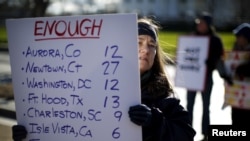When he fired rounds of bullets in an Orlando, Florida, nightclub early Sunday, killing at least 49 people, Omar Mateen triggered a refrain now common after U.S. mass shootings.
While offering condolences, President Barack Obama for at least the fifteenth time publicly condemned a devastating attack and called for stricter gun laws. (He also acknowledged the incident was a terrorist attack.) Other politicians tweeted expressions of sympathy and, depending on party affiliation, urged legislative action on gun control or assigned blame for security gaps.
Gun access is one of the most politically loaded issues in the United States. The Constitution’s Second Amendment protects the right to bear arms, but Americans are divided on just who should have access to guns, and to what kind. Many believe these are very different times from when the Constitution was written more than 230 years ago.
Polls show broad public support for background checks for firearms purchases, though diminished backing for gun control overall in recent years. That comes even as the number of American households with guns has fallen to roughly a third, down from about a half four decades ago, the University of Chicago’s NORC opinion research center found in a report last year. It cited declining interest in hunting as a big factor.
Likewise, Congress has been split. Republicans generally favor broader access and fewer restrictions than Democrats, though support also varies by geography — rural versus urban — and by culture. Activists on all sides of the gun debate largely have turned their attention to changes at the state level.
NRA's grades
The National Rifle Association aims to influence major elections by grading political candidates, giving more favorable marks to those who oppose most limitations. It said it would grade presidential contenders after party nominations have been confirmed.
Shortly after the December 2 terrorist shootings in San Bernardino, California, in which a couple claiming loyalty to the Islamic State group killed 14 people and wounded 22 others, the Senate rejected two gun control measures. Politico noted they “were designed by Democrats to put Republicans on record on the charged issue.”
On Monday, a group of Democratic senators said they planned to revive one of the measures, sponsored by Dianne Feinstein of California. It would close a loophole that now allows people on an FBI terrorist watch list to legally buy guns if they clear a background check.
House Speaker Paul Ryan, a Wisconsin Republican, planned to meet with his leadership team to determine whether and how to respond.
Linda Finkel-Talvadkar, co-founder of a group that advocates for universal background checks and a few other reforms, said she went to its weekly Monday noon demonstration in front of the White House “deeply saddened” by the Orlando deaths but “motivated” to pressure Congress.
“We cannot give up,” she said.
Her group, We the People for Common-sense Gun Laws, was waiting for a complete list of the Orlando victims’ names to add them to a long timeline of mass shootings. Finkel-Talvadkar said the timeline also needs names from a mass shooting last weekend in Roswell, New Mexico, in which a woman and four children were killed. Police were searching for the woman's husband, suspected in the killings.















